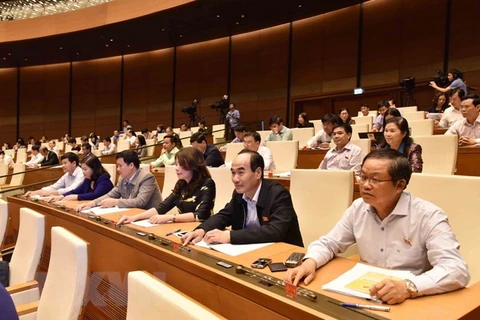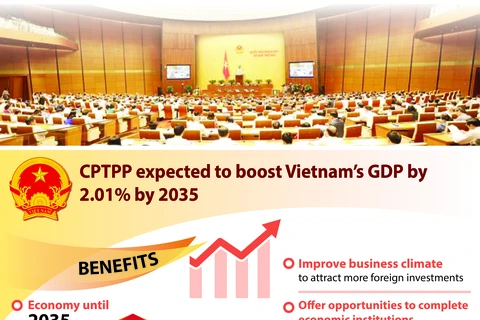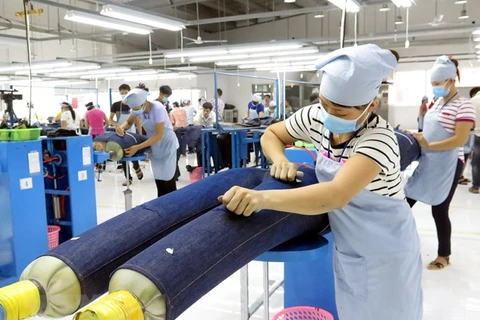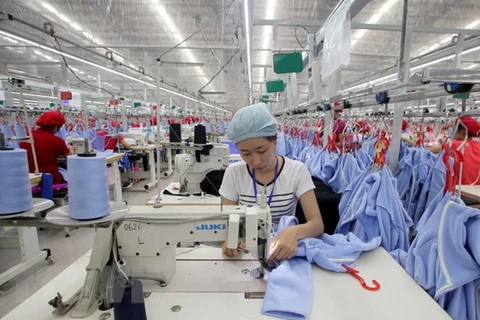 Students in class at the Dak Lak Vocational College in the Central Highland’s province of Dak Lak. (Photo: VNA)
Students in class at the Dak Lak Vocational College in the Central Highland’s province of Dak Lak. (Photo: VNA) Hanoi (VNA) – In addition to trade and investment opportunities, the participation in the Comprehensive and Progressive Agreement for Trans-Pacific Partnership (CPTPP) will offer Vietnam a chance to modernise its labour laws and industrial relations system, thus creating sustainable jobs and bringing practical benefits to workers.
Vietnam officially became a member of the CPTPP after the 14th National Assembly passed a resolution on November 12, approving the deal and related documents with 96.7 percent of votes.
The CPTTP, together with the EU-Vietnam Free Trade Agreement (EVFTA), includes specific requirements on labour rights and work conditions to ensure that the free flow of trade will contribute to sustainable development and enable workers and businesses to enjoy their fair share of economic gains, according to the International Labour Organisation (ILO).
Having to abide by labour commitments and requirements was an inevitable result of joining FTAs, said Head of the Ministry of Labour, Invalids and Social Affairs’ Department of International Cooperation Nguyen Manh Cuong at a dialogue on Vietnam’s CPTPP labour commitments in Hanoi on November 13.
The implementation mechanisms foreseen in the agreement include co-operative activities to engage representatives of business and worker organisations as well as international organisations such as the ILO to strengthen labour market institutions that lay the foundation for improving social dialogue between employers and workers, according to the ILO.
“This is an opportunity for Vietnam to modernise its labour laws,” said ILO Vietnam’s director Chang-Hee Lee in a press release. “The need for such reforms comes from the country’s internal context.”
In years after the CPTPP comes into effect, it is expected workers will be allowed to establish or join organisations of their own choosing, which can choose whether they will be part of the Vietnam General Confederation of Labour (VGCL).
Vice President of the VGCL Ngo Duy Hieu said facing membership competition would be a chance for VGCL to continue its reforms and improve its efficiency to better represent workers.
Vietnam committed to fully implementing its CPTPP labour obligations from the day it takes effect in the country, said Cuong.
"The country is in the process of amending the Labour Law to make it fall in line with some contents of the CPTPP and make its commitments about labour more concrete," he said.
It is expected to take three to five years for Vietnam to amend the law and its related regulations, and to improve awareness among the public, workers and enterprises, according to Cuong.
Director of the Institute of Labour Science and Social Affairs Dao Quang Vinh said the institute’s recent study on impacts of Vietnam’s participation in FTAs showed that joining CPTPP would help to create 17,000-27,000 jobs each year for Vietnamese workers from 2020.
FTA participation would also help increase investment flows, enhance competitiveness and productivity, draw more skilled labourers and raise workers’ incomes, he said.
However, Vinh said big wage differences would be seen between foreign-invested enterprises and local businesses as well as between skilled labourers and low-qualified workers, thus creating policy challenges relating to employment, job generation and vocational training.
He also stressed that Vietnam needed to prepare its workforce to take advantage of opportunities created by the agreement.
“For example, when tariffs are reduced, will Vietnam improve productivity in order to tap this market opportunity?” he said. “It depends on how we prepare human and investment resources to ensure that Vietnamese products will be accepted by members of the agreement.”
He warned that changes in employment and labour structures would happen more rapidly than forecasted due to FTAs and the Fourth Industrial Revolution, so Vietnamese policy makers need to amend their forecast.
VGCL Vice President Hieu suggested increasing information dissemination to raise awareness of the public, enterprises and credit institutions of opportunities and challenges of CPTPP.
The Government should build specific plans after CPTPP takes effect in order to deal with initial and long-term challenges, he said.
The 11-nation accord, which forms a market of 500 million people, is expected to increase Vietnam’s GDP by an additional 2.01 percent by 2035, according to the Ministry of Planning and Investment.-VNA
VNA























